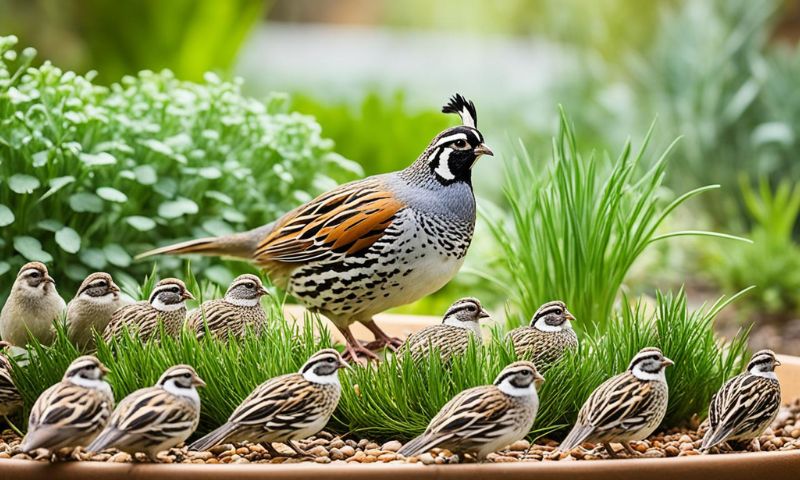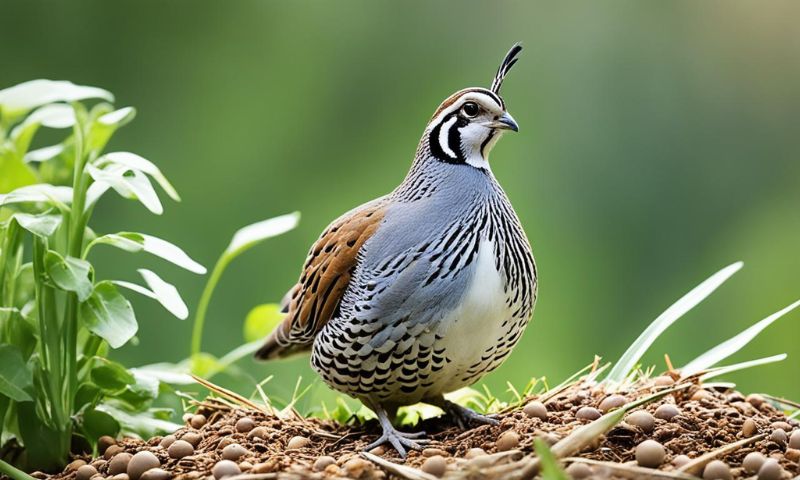The Effects of Stress on Quail Egg Production
Welcome to the first section of our article, where we will explore the impact of stress on quail egg production. Quails are fascinating birds that are widely known for their ability to produce nutritious and delicious eggs. However, just like any other living creature, quails can experience stress, which can have a detrimental effect on their egg-laying abilities. Understanding the various stress factors that affect quail eggs is essential for successful quail farming.
Understanding Stress in Quail Farming
In the world of quail farming, stress can significantly impact the health and productivity of these birds. Understanding the sources of stress and implementing effective coping strategies is crucial for successful quail farming. This section will delve into the different factors that contribute to stress in quail farming, including environmental conditions and management practices. It will also provide insights into the overall effects of stress on the well-being and productivity of quails.
One of the primary sources of stress in quail farming is environmental factors. Quails are sensitive creatures that require specific temperature and lighting conditions to thrive. Fluctuations in temperature, inadequate ventilation, and inappropriate lighting can all contribute to stress in quails. Proper temperature control and sufficient natural or artificial lighting are essential for maintaining a stress-free environment for these birds.
Management practices can also induce stress in quails. Handling and transportation procedures, overcrowded living conditions, and abrupt changes in their surroundings can all disrupt the natural rhythm of quails and cause them distress. Additionally, disturbances such as noise, predatory threats, and social hierarchy conflicts can add to their stress levels.
When quails are exposed to prolonged or excessive stress, it can have detrimental effects on their overall health and productivity. Chronic stress weakens their immune system, making them more susceptible to diseases and infections. It can also disrupt their reproductive cycles, leading to reduced egg production and fertility issues.
“Stress is the silent enemy of productive quail farming. By understanding and addressing the various sources of stress, farmers can create an environment that promotes quail well-being and maximizes productivity,” says Dr. Samantha Reynolds, a renowned expert in quail farming.

The journey towards successful quail farming starts with identifying potential stressors and implementing effective stress relief techniques. By providing quails with optimal environmental conditions, ensuring proper handling and management practices, and minimizing disturbances, farmers can create a stress-free and productive environment for their quails.
Managing Stress in Quail Egg Production
Effective stress management is crucial for successful quail egg production. By implementing proper techniques to reduce stress in the quail farming environment, farmers can ensure the well-being and productivity of their quails. Let’s explore some stress management strategies that can be employed in different stages of quail egg production.
Minimizing Stress in the Quail Farming Environment
Creating a conducive environment for quails is essential for minimizing stress. The following factors should be considered:
- Housing: Provide spacious and well-ventilated housing facilities that offer adequate space for quails to move around comfortably. Optimal temperature and lighting conditions should be maintained to create a stress-free environment.
- Nutrition: Ensure a balanced and appropriate diet for the quails. Proper nutrition plays a vital role in reducing stress and promoting overall health.
- Handling Techniques: Use gentle and calm handling techniques during routine farm operations, such as health checks and egg collection. Avoid any unnecessary disturbances or loud noises that may cause stress to the quails.
Reducing Stress during Egg Collection, Incubation, and Hatching Processes
Proper management during crucial stages of quail egg production further contributes to stress reduction. Consider the following techniques:
- Egg Collection: Collect eggs regularly to prevent overcrowding and minimize the chances of eggs getting damaged. Handle eggs carefully to avoid breakages or contamination.
- Incubation: Maintain stable temperature and humidity levels during the incubation process. Proper ventilation and turning schedules are critical for successful incubation and hatching.
- Hatching: Provide a calm and warm environment for the hatching process. Avoid disturbing the quail chicks during this delicate stage as it can cause unnecessary stress and impact their overall health.
Implementing these stress management techniques not only promotes the well-being of the quails but also enhances their egg production capabilities. By reducing stress, farmers can ensure a steady supply of high-quality quail eggs and achieve long-term success in their quail farming endeavors.

| Benefits of Effective Stress Management in Quail Egg Production | Consequences of Inadequate Stress Management |
|---|---|
| 1. Increased quail reproductive performance | 1. Reduced egg production |
| 2. Improved egg quality and hatchability | 2. Decreased hatch rates |
| 3. Higher overall quail productivity | 3. Weakened immune system and increased susceptibility to diseases |
Overcoming Stress-Related Challenges in Quail Farming
Quail farming comes with its own set of challenges, many of which are directly related to stress. Minimizing stress in quail egg production is crucial for maintaining the health and productivity of the quails. Let’s explore some practical solutions and tips for overcoming these challenges and ensuring successful quail farming.
1. Disease Prevention
Elevated stress levels in quails can weaken their immune system, making them more susceptible to diseases. Implementing a comprehensive disease prevention program is essential for minimizing stress and keeping the quails healthy. This includes regular vaccinations, quarantine protocols for introducing new birds, and maintaining a clean and hygienic environment.
2. Behavior Management
Stress can cause behavioral issues in quails, leading to negative consequences for both their well-being and egg production. By promoting positive behaviors and providing adequate mental and physical stimulation, quail farmers can reduce stress levels and improve overall productivity. This can be achieved through enrichment activities, proper socialization, and the provision of a comfortable and stimulating environment.
3. Implementing Stress Reduction Practices
Stress reduction practices play a vital role in minimizing stress in quail farming. Creating a stress-free environment involves optimizing housing conditions, implementing appropriate lighting and ventilation, and ensuring a consistent and suitable temperature. Additionally, reducing noise levels and handling the quails gently and responsibly can contribute to their well-being and productivity.
“Stress-related challenges in quail farming require proactive measures to prevent and overcome them. By addressing disease prevention, behavior management, and implementing stress reduction practices, quail farmers can ensure the health and productivity of their quails.”
By following these strategies, quail farmers can effectively overcome stress-related challenges and optimize quail egg production. It is essential to prioritize the well-being of the quails and create an environment that minimizes stress, as it directly impacts their overall health and the quality of their eggs.
| Challenge | Solution |
|---|---|
| Weak immune system and disease susceptibility | Implement a comprehensive disease prevention program, including vaccinations and quarantine protocols. |
| Behavioral issues affecting productivity | Promote positive behaviors through enrichment activities, socialization, and a stimulating environment. |
| Stressful environment | Optimize housing conditions, lighting, ventilation, temperature, and minimize noise levels. |
| Improper handling techniques | Handle quails gently and responsibly to reduce stress levels. |
Conclusion
Managing stress in quail egg production is crucial for maintaining the health and productivity of quails. As we have discussed, stress can significantly impact the yield of quail eggs, leading to decreased production and potentially compromising the overall success of a quail farming operation.
Through understanding the various sources of stress in quail farming and implementing effective stress management techniques, farmers can minimize the negative effects of stress on their quails. Proper housing, nutrition, and handling practices play a vital role in creating a stress-free environment for these birds.
Furthermore, reducing stress during critical stages such as egg collection, incubation, and hatching is essential for successful quail egg production. By implementing stress reduction practices during these processes, farmers can increase the chances of healthy hatchlings and maximize their egg yield.
In conclusion, stress management is a fundamental aspect of quail farming. By prioritizing the well-being of the quails and minimizing stress factors, farmers can ensure the long-term sustainability and profitability of their quail egg production. Adopting these stress management techniques will ultimately lead to healthier and more productive quails, enabling quail farmers to meet market demands and maintain their competitive edge.
FAQ
What are the effects of stress on quail egg production?
Stress can have detrimental effects on quail egg production. It can lead to decreased egg laying, reduced hatchability, and lower egg quality. Additionally, stressed quails may exhibit behavioral issues, such as aggression and cannibalism, which can further impact egg production.
What are the sources of stress in quail farming?
There are various sources of stress in quail farming, including environmental factors such as high temperatures, inadequate lighting, and poor ventilation. Other stress-inducing factors include overcrowding, improper feeding and watering practices, and excessive noise or disturbance in the farming environment.
How can stress be managed in quail egg production?
Effective stress management techniques can help minimize the negative impact on quail egg production. This includes providing a suitable and well-maintained housing environment with proper ventilation, temperature control, and lighting. Implementing a balanced diet, ensuring adequate nutrition, and practicing gentle handling techniques also contribute to stress reduction in quail farming.
What challenges are associated with stress in quail farming?
Stress in quail farming can lead to various challenges, such as increased susceptibility to diseases and parasites. It can also result in decreased feed intake, weight loss, and reduced overall health of the quails. Managing aggressive behavior and preventing egg cannibalism are additional challenges that can arise due to stress in the farm.
How important is stress management in quail egg production?
Stress management is crucial for successful quail egg production. By implementing stress reduction measures, farmers can maintain the overall health and well-being of their quails, ensuring optimal egg production. Effective stress management techniques also help to minimize the occurrence of stress-related challenges, resulting in a more productive and sustainable quail farming operation.